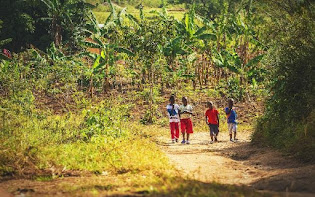“Did the president announce reopening of schools in the
address?” Our village primary and high schools had been closed for a 42-day
lockdown due to COVID, and I was hoping for good news.

“No, Mama. Some
restrictions are lifted but schools and churches are still closed. The next
announcement will come in 60 days,” Julius, our Program Manager told me.
My heart sunk. 60 more days of closure? 600 children normally fill our campuses with laughter and life. Their colorful uniforms painting a collage of hope as they stream into the buildings from orange dirt paths leading from every direction. School is a haven of safety. A place with food, friends, health care, and growing in knowledge and faith. COVID lockdowns had kept all of that from them.
“We have to pivot, Julius. We can’t keep waiting for schools
to reopen. Can we bring the kids to us in small groups? Can we go to them?” I
asked.
This touched off some fast planning by our team to organize
a student outreach program that would bring kids to school in small groups for
counseling, encouragement, prayer, a big meal, and to receive take-home school
and discipleship materials. The teachers worked fast, phone calls were made to
students and area leaders, and the program kicked-off the first week of
September.
The first reports back reinforced that the outreach was
making an impact but also our fears about what the children had been enduring during
the school closures.
“The children have been coping with quite
a lot at home,” High school Head Teacher, Jotham, wrote in his report after the
first few days. “The psycho-social
counseling part of the outreach has been so important. We listen, counsel, and pray for the students. We are identifying
families we need to visit in-person.”
 |
| Happy students with their learning resources and food packages |
Their reports noted more than a dozen problems plaguing many
of the children. The lockdowns had disrupted the already fragile economy, and things
were harder than normal.
I
read, “Some are engaged in child labor since they have to look for something to
survive. Some are discouraging girls from going back to school and forced
marriages of girls are rampant,” noted Jotham.
 Robinah’s
report stated, “Lack of food and basic needs has led some into prostitution. Some
feel they have overgrown school. The repeated lock downs have them studying in
the same classes for so long.”
Robinah’s
report stated, “Lack of food and basic needs has led some into prostitution. Some
feel they have overgrown school. The repeated lock downs have them studying in
the same classes for so long.”
It
was hard to keep reading, “Some parents have left to look for work and thrown the responsibility of
looking after families to the children, especially the boys, who have now
resorted to doing odd jobs to support their siblings.”
Though devastating to read, it also reinforced the difference the schools had been making. The outreach team encourages each child and helps lift the load of their troubles where they can. They are equipped
to provide food for households where there isn’t enough to eat. They make home
visits to counsel and advocate for girls to be given a chance to continue in
school. Children receive learning materials to revive their hope in studying
again. The kids are loved, nurtured, and encircled with care and community.
It
feels so small in the face of the challenges, but Uganda has taught us to focus on what we can do instead of being
discouraged by what we can’t. For today, we’ll continue serve each and every student as we can, and we
will pray that one day soon, children will again be streaming into our
classrooms from orange dirt paths coming from every direction.
“For we are God’s workmanship, created in Christ Jesus to do Good works which God prepared in advance for us to do.” Ephesians 2:10

.jpg)














